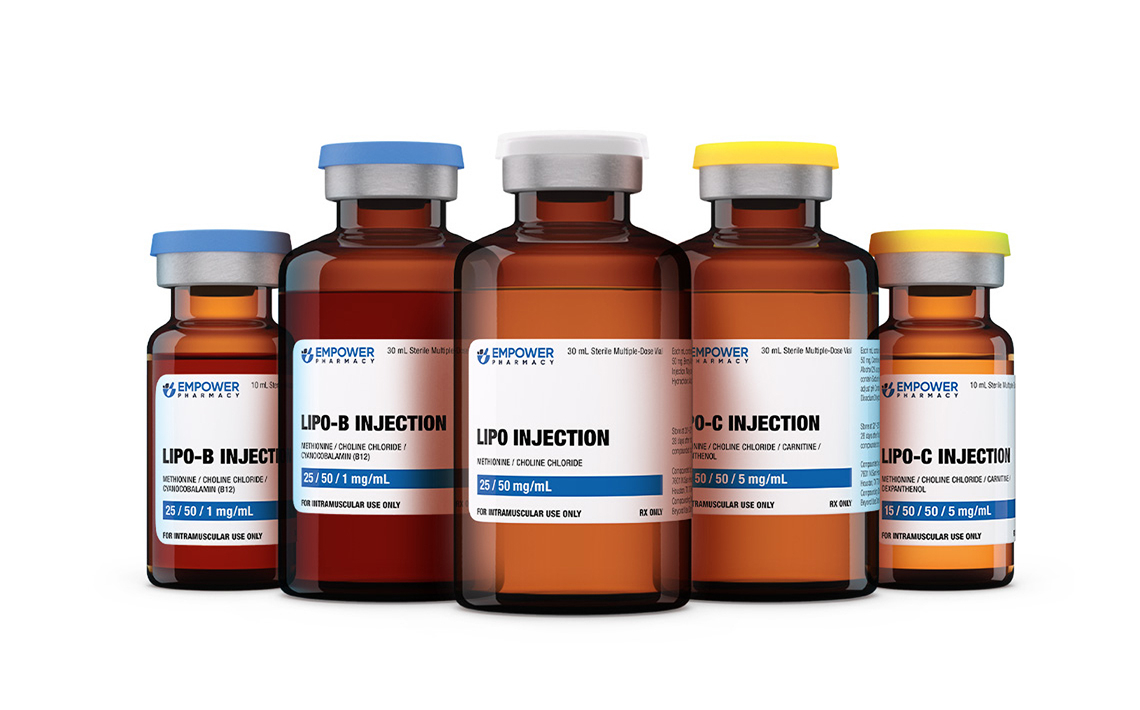Article Summary
Lipotropic injections release fat, target fatty deposits, and enhance metabolism with amino acids like methionine and choline, often combined with B-12 for energy. These injections, administered with a low-calorie diet and exercise, promote fat loss, energy, and overall health.Methionine Choline Injections, also referred to as Lipotropic Injections, or Lipo Injections, are used to help release fat throughout the body by specifically targeting its primary fatty deposits. Lipotropic, or fat-burning substances include choline, which distributes cholesterol and prevents it from getting deposited in one part of the body, and methionine which amplifies it. Injections can be administered up to twice a week, and vitamin B-12 is purported by practitioners and users to help accelerate metabolic processes while creating a greater feeling of overall energy. Since lipotropics directly aid in the breakdown of fatty tissue and are also closely related to B vitamins, when used together, they are thought to intensify each others’ effects and are usually injected together as part of the same treatment injection cycle.
How Lipotropic Injections Work
The amino acids that are injected into the body stimulate the liver to optimize the process of metabolism. These injections boost the body’s metabolic power by providing a highly effective temporary increase of normal metabolic functions. As soon as the effect of these substances wears off, the body begins to gradually return to its normal metabolic rate. When administered in combination with a low-calorie diet and regular exercise, our lipotropic formulas can help your body to rid itself of fat, while simultaneously increasing your energy levels both via the fat-released energy and the energy-promoting properties of vitamin B-12. The formula used in the Lipo Injection specially blends the following important ingredients:
Methionine
Methionine is an essential amino acid, which means that it is not synthesized in humans. This amino acid acts as a lipotropic agent that: assists in the breakdown of fats within the liver; helps to lower cholesterol thereby preventing excess fat buildup in the liver and throughout your body’s circulatory system; is helpful in preventing and relieving fatigue; and is useful in some cases of allergies by virtue of its ability to reduce histamine release.[1][2][3]
One of the sulfur-containing amino acids (along with cysteine and cystine), methionine is important (essential) to many bodily functions and must be directly consumed through supplementation or methionine-containing proteins. Foods that contain high levels of methionine include cheese, eggs, fish, meats, spinach, potatoes, Brazil nuts, sesame seeds, and select other plant seeds. However, by injecting methionine into your muscles you can rapidly achieve high concentrations which many researchers and physicians believe results in more effective mobilization and elimination of abnormal fatty deposits. Other reported benefits of methionine include improvement of liver disease; skin tone and elasticity; nails; hair; and cardiovascular and muscular functions, through its role in the production of creatine. It has also been used to treat premature ejaculation, chronic depression, pancreatitis, Parkinson’s disease, and AIDS myelopathy. More specifically, clinical research has clearly demonstrated methionine’s ability to “…strongly improve the alcohol-induced histological changes in the liver. Triglyceride content of the liver was found to decrease in a dose-dependent manner with increasing methionine ingestion.[4]
Choline
Choline is an essential nutrient that helps to support the liver in its processing and excretion of chemical waste products. Moreover, it is required for the transport and metabolism of fats and cholesterol, which is important for the healthy support of the endocrine, cardiovascular, and hepatic systems.
A few specific studies have clearly demonstrated:
“Choline supplementation normalized cholesterol metabolism, which was sufficient to prevent nonalcoholic steatohepatitis development and improve liver function. Our data suggest that choline can promote liver health by maintaining cholesterol homeostasis.”[5] “Choline induces glucose and insulin intolerance in Pemt(-/-) mice through modulating plasma glucagon and its action in liver.”[6] Choline supplementation decreased the concentration of liver triacylglycerol during the first 4 wk after parturition. Results from this study suggest that hepatic fat export in periparturient dairy cows is improved by choline supplementation during the transition period and this may potentially decrease the risk for metabolic disorders in the periparturient dairy cow.”[7] Choline is also known to be involved in the synthesis of carnitine, cell membrane phospholipids, and the neurotransmitter acetylcholine. It is a major source for methyl groups via its metabolite trimethylglycine (betaine) that participates in the S-adenosylmethionine synthesis pathways. Lastly, choline has also been shown to specifically aid with memory, and to support the maintenance of a healthy nervous system.[8][9] Food sources of choline include peanuts, soybeans, wheat, chicken, fish, beef, cauliflower, eggs, and lettuce.
Cyanocobalamin (Vitamin B-12)
This form of B-12 vitamin is used in our Lipo-B injection and plays a significant role in the replication of DNA, the normal functioning of the nervous system, and the formation of blood cells. The vitamin B-12 injection has been shown to provide these key benefits: boosts energy and overall metabolic rate; assists in the burning of stored body fat; detoxifies the body; increases red blood cell production; maintains a healthy liver; helps regulate sleep, mood, appetite and energy; works synergistically with other nutrients to improve health; and slows aging.[10][11][12]
Vitamin B-12 is frequently used in combination with other B vitamins in a vitamin B-complex formulation. Important in DNA synthesis, vitamin B-12 is bound to the protein in food, and is released by stomach acids during digestion. Once released, B-12 combines with a substance called intrinsic factor (IF) before it is absorbed into the bloodstream. Essentially water-soluble this vitamin is commonly found in a variety of foods such as fish, shellfish, meat, eggs, and dairy products. Read more about Vitamin B-12 Injections.
L-Carnitine – Carnitine is an amino acid which is required for the transport and breakdown of body fat for the generation of metabolic energy. Studies show that oral L-Carnitine supplementation can decrease fat mass, preserve muscle during exercise, and reduce muscle fatigue.[13] Further research over the last decade has shed new light on the importance of L-carnitine as a regulator of skeletal muscle fuel selection, which means it is needed to determine whether muscle tissue utilizes carbohydrates or fat for energy.[14] When taken orally, L-Carnitine requires a high dose to promote fat tissue breakdown.[15][16] This is because only a fraction of carnitine is absorbed during oral digestion. When administered by injection, nutrients like L-Carnitine are completely absorbed by the body.
- Biochem J. 1938 Jun;32(6):969-75. The action of cystine and methionine on liver fat deposition. Channon HJ1, Manifold MC, Platt AP.
- Biol Trace Elem Res. 2007 Winter;120(1-3):179-94. The influence of methionine, selenomethionine, and vitamin E on liver metabolic pathways and steatosis in high-cholesterol fed rabbits. Birkner E1, Zalejska-Fiolka J, Kasperczyk A, Kasperczyk S, Grucka-Mamczar E, Stawiarska-Pieta B, Birkner K.
- J Lab Clin Med. 1948 Sep;33(9):1123-32. The effect of choline, methionine, and low fat diet on the life expectancy of patients with cirrhosis of the liver. Wade L, Neudorff L, et al.
- Alcohol Clin Exp Res. 1998 Apr;22(2):352-8. Free methionine supplementation limits alcohol-induced liver damage in rats. Parlesak A1, Bode C, Bode JC.
- J Nutr. 2014 Mar;144(3):252-7. Choline Supplementation Protects against Liver Damage by Normalizing Cholesterol Metabolism in Pemt/Ldlr Knockout Mice Fed a High-Fat Diet. Al Rajabi A1, Castro GS, da Silva RP, Nelson RC, Thiesen A, Vannucchi H, Vine DF, Proctor SD, Field CJ, Curtis JM, Jacobs RL.
- J Biol Chem. 2013 Jan 11;288(2):837-47. Choline supplementation promotes hepatic insulin resistance in phosphatidylethanolamine N-methyltransferase-deficient mice via increased glucagon action. Wu G1, Zhang L, Li T, Zuniga A, Lopaschuk GD, Li L, Jacobs RL, Vance DE.
- J Dairy Sci. 2011 Aug;94(8):4016-27. Effect of rumen-protected choline on performance, blood metabolites, and hepatic triacylglycerols of periparturient dairy cattle. Zom RL1, van Baal J, Goselink RM, Bakker JA, de Veth MJ, van Vuuren AM.
- Methods Find Exp Clin Pharmacol. 1997 Apr;19(3):201-10. Citicoline improves memory performance in elderly subjects. Alvarez XA1, Laredo M, Corzo D, Fernández-Novoa L, Mouzo R, Perea JE, Daniele D, Cacabelos R.
- Arch Neurol. 1996 May;53(5):441-8. Citicoline improves verbal memory in aging. Spiers PA1, Myers D, Hochanadel GS, Lieberman HR, Wurtman RJ.
- Int J Vitam Nutr Res Suppl. 1989;30:205-12. Adequacy of vitamin supply under maximal sustained workloads: the Tour deFrance. Saris WH, Schrijver J, van Erp Baart MA, Brouns F.
- J Nutr. 2009 Sep;139(9):1744-50. Provision of a school snack is associated with vitamin B-12 status, linear growth, and morbidity in children from Bogota, Colombia. Arsenault JE1, Mora-Plazas M, Forero Y, López-Arana S, Marín C, Baylin A, Villamor E.
- J Nutr. 2002 Nov;132(11):3353-5. Increases in blood folate indices are similar in women of childbearing age supplemented with [6S]-5-methyltetrahydrofolate and folic acid. Venn BJ1, Green TJ, Moser R, McKenzie JE, Skeaff CM, Mann J.
- University of Maryland Medical Centre. 2002. https://umm.edu/health/medical/altmed/supplement/carnitine-lcarnitine
- Stephens, F.B., Constantin-Teodosiu, D., and Greenhaff, P.L., New insights concerning the role of carnitine in the regulation of fule metabolism in skeletal muscle, J. Physio., 581(pt2), 431-444, 2007.
- Slonim, A.E., Borum, P.R., Tanaka, K., et al., Dietary dependent carnitine deficiency as a cause of nonketotic hypoglycemia in an infant, J. Prediatr., 551-556, 1981.
- Helms, R.A., Whitington, P.F., Mauer, E.C., et al., Enhanced lipid utilization in infants receiving oral L-carnitine during long term parenteral nutrition, J. Pediatr., 109, 984-988, 1986.




